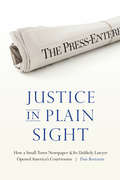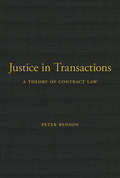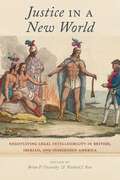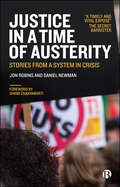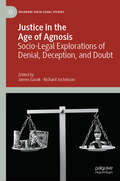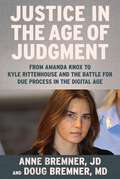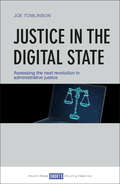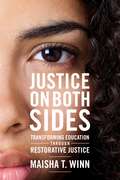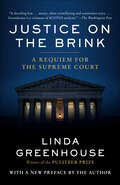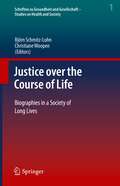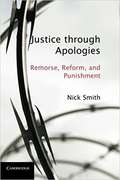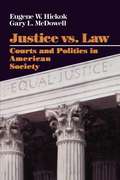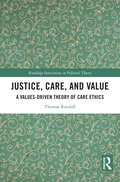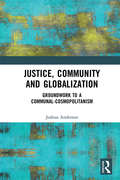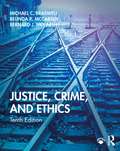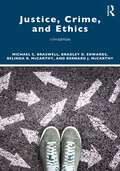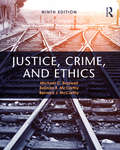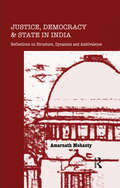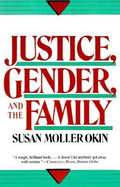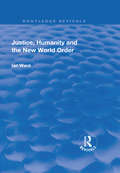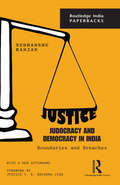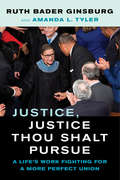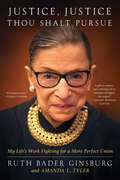- Table View
- List View
Justice in Plain Sight: How a Small-Town Newspaper and Its Unlikely Lawyer Opened America's Courtrooms
by Dan BernsteinJustice in Plain Sight is the story of a hometown newspaper in Riverside, California, that set out to do its job: tell readers about shocking crimes in their own backyard. But when judges slammed the courtroom door on the public, including the press, it became impossible to tell the whole story. Pinning its hopes on business lawyer Jim Ward, whom Press-Enterprise editor Tim Hays had come to know and trust, the newspaper took two cases to the U.S. Supreme Court in the 1980s. Hays was convinced that the public—including the press—needed to have these rights and needed to bear witness to justice because healing in the aftermath of a horrible crime could not occur without community catharsis. The newspaper won both cases and established First Amendment rights that significantly broadened public access to the judicial system, including the right for the public to witness jury selection and preliminary hearings.Justice in Plain Sight is a unique story that, for the first time, details two improbable journeys to the Supreme Court in which the stakes were as high as they could possibly be (and still are): the public's trust in its own government.
Justice in Plainclothes: A Theory of American Constitutional Practice
by Lawrence G. SagerSager (law, U. of Texas, Austin) examines constitutional practice in the United States. He treats judges as active partners in the enterprise of securing the fundamentals of political justice and sees the process of constitutional adjudication as a distinctly democratic addition to that enterprise. He also presents a case for the constitutional right to secure a materially decent life and argues that the Constitution's obduracy to amendment is one of its virtues. Annotation ©2004 Book News, Inc. , Portland, OR (booknews. com)
Justice in Transactions: A Theory of Contract Law
by Peter BensonLegal thinkers typically justify contract law on the basis of economics or promissory morality. But Peter Benson takes another approach. He argues that contract is best explained as a transfer of rights governed by a conception of justice. The result is a comprehensive theory of contract law congruent with Rawlsian liberalism.
Justice in a New World: Negotiating Legal Intelligibility in British, Iberian, and Indigenous America (Religion and Social Transformation)
by Brian P Owensby Richard J RossA historical and legal examination of the conflict and interplay between settler and indigenous laws in the New WorldAs British and Iberian empires expanded across the New World, differing notions of justice and legality played out against one another as settlers and indigenous people sought to negotiate their relationship. In order for settlers and natives to learn from, maneuver, resist, or accommodate each other, they had to grasp something of each other's legal ideas and conceptions of justice.This ambitious volume advances our understanding of how natives and settlers in both the British and Iberian New World empires struggled to use the other’s ideas of law and justice as a political, strategic, and moral resource. In so doing, indigenous people and settlers alike changed their own practices of law and dialogue about justice. Europeans and natives appealed to imperfect understandings of their interlocutors’ notions of justice and advanced their own conceptions during workaday negotiations, disputes, and assertions of right. Settlers’ and indigenous peoples’ legal presuppositions shaped and sometimes misdirected their attempts to employ each other’s law. Natives and settlers construed and misconstrued each other's legal commitments while learning about them, never quite sure whether they were on solid ground. Chapters explore the problem of “legal intelligibility”: How and to what extent did settler law and its associated notions of justice became intelligible—tactically, technically and morally—to natives, and vice versa? To address this question, the volume offers a critical comparison between English and Iberian New World empires. Chapters probe such topics as treaty negotiations, land sales, and the corporate privileges of indigenous peoples. Ultimately, Justice in a New World offers both a deeper understanding of the transformation of notions of justice and law among settlers and indigenous people, and a dual comparative study of what it means for laws and moral codes to be legally intelligible.
Justice in a Time of Austerity: Stories From a System in Crisis
by Daniel Newman Jon RobinsHow are poverty and social inequality entrenched through a failing justice system? In this important book, Jon Robins and Daniel Newman examine how the lives of people already struggling with problems with their welfare benefits, jobs, housing and immigration are made much harder by cuts to legal aid and the failings of our creaking justice system. Over the course of 12 months, interviews were carried out on the ground in a range of settings with people as they were caught up in the justice system, in a range of settings such as foodbanks in a church hall in a wealthy part of London; a community centre in a former mining town; a homeless shelter for rough sleepers in Birmingham; and a destitution service for asylum seekers in a city on the South coast, as well as in courts and advice agencies up and down the country. The authors argue that a failure to access justice all too often represents a catastrophic step in the life of the person concerned and their family. This powerful, yet moving, account humanises the hostile political debates that surround legal aid and reveals what access to justice really means in Austerity Britain.
Justice in the Age of Agnosis: Socio-Legal Explorations of Denial, Deception, and Doubt (Palgrave Socio-Legal Studies)
by Richard Jochelson James GacekThis book seeks to further the understanding of the human experience of coerced and forced ignorance on social, human rights and criminal justice related topics, drawing together scholars from multiple, disciplinary fronts. It argues that people in our social world are forced or coerced through either implicatory or interpretive denial that is normalized through specific cultural and social mechanisms by which we refer to this as non-knowledge or agnosis. There has also been a lack of scholarship which examines how human victimization and power intersects by and through the systematic orchestration of forced ignorance and doubt upon daily human life. This book's focus is an examination of the ways in which people find themselves in social spaces without empirical clarity and understand that absence as satisfaction, stability, or perhaps even pleasure. It discusses a range of topics, including for example people's sense of relative safety, despite empirical realities suggesting otherwise. This book seeks to make visible the role of ignorance in governing society, highlighting how the late modern human experience in a post-World War II human rights era subsumes, subverts, and sublimates the complex relationship between knowledge and denial; the empirical gulf between knowledge and resistance may indeed breed complicit bliss.
Justice in the Age of Judgment: From Amanda Knox to Kyle Rittenhouse and the Battle for Due Process in the Digital Age
by Anne Bremner Doug Bremner MDFrom Amanda Knox to O.J., Casey Anthony to Kyle Rittenhouse, our justice system faces scrutiny and pressure from the media and public like never before. Can the bedrock of &“innocent until proven guilty&” survive in what acclaimed Seattle attorney and legal analyst Anne Bremner calls the age of judgement? When unscrupulous Italian prosecutors waged an all-out war in the media and courtroom to wrongly convict American exchange student Amanda Knox for a murder she didn&’t commit, family and friends turned to renowned Seattle attorney and media legal analyst Anne Bremner to help win her freedom. The case was dubbed the &“trial of the decade&” and would coincide with the explosion of social media and a new era of trying cases in public as much as the courtroom. While Italian prosecutors, the press, and online lynch mobs convicted Knox in the court of public opinion, Bremner would draw upon her decades in the courtroom and in front of the camera to turn the tide with a new kind of defense in pursuit of justice. In Justice in the Age of Judgement, Anne Bremner and Doug Bremner take us inside some of the biggest cases of recent times and offer their expert, thought-provoking insights and analysis as our legal system faces unprecedented forces fighting to tip the scales of justice their way. Why couldn&’t prosecutors convict O.J. Simpson despite all of the evidence seemingly proving he killed his wife Nicole? Could a jury remain unbiased in the face of overwhelming public pressure in the trial of Minneapolis police officer Derek Chauvin for the murder of George Floyd? Why was Kyle Rittenhouse exonerated after shooting three people (killing two) with an assault rifle at a violent rally despite widespread media reports seemingly proving his guilt, and national calls for his conviction?Justice in the Age of Judgement is an unparalleled and unflinching look at the captivating cases tried on Twitter and TV, where the burden of proof and fundamental legal tenet of &“innocent until proven guilty&” is under assault from the court of public opinion.
Justice in the Digital State: Assessing the Next Revolution in Administrative Justice
by Joe TomlinsonAvailable Open Access under CC-BY-NC licence. Exploring how justice is delivered at a time of rapid technological transformation, Justice in the Digital State exposes urgent issues surrounding the modernisation of courts and tribunals whilst examining the effects of technology on established systems. Case studies investigate the rise of crowdfunded judicial reviews, the digitalisation of tribunals and the rise of ‘agile’ methodologies in building administrative justice systems. Joe Tomlinson’s cutting-edge research offers an authoritative and much-needed guide for navigating through the challenges of digital disruption.
Justice on Both Sides: Transforming Education through Restorative Justice (Race and Education)
by Maisha T. WinnRestorative justice represents “a paradigm shift in the way Americans conceptualize and administer punishment,” says author Maisha T. Winn, from a focus on crime to a focus on harm, including the needs of both those who were harmed and those who caused it. Her book, Justice on Both Sides, provides an urgently needed, comprehensive account of the value of restorative justice and how contemporary schools can implement effective practices to address inequalities associated with race, class, and gender. <p><p> Winn, a restorative justice practitioner and scholar, draws on her extensive experience as a coach to school leaders and teachers to show how indispensable restorative justice is in understanding and addressing the educational needs of students, particularly disadvantaged youth. Justice on Both Sides makes a major contribution by demonstrating how this actually works in schools and how it can be integrated into a range of educational settings. It also emphasizes how language and labeling must be addressed in any fruitful restorative effort. Ultimately, Winn makes the case for restorative justice as a crucial answer, at least in part, to the unequal practices and opportunities in American schools.
Justice on Trial: The Kavanaugh Confirmation and the Future of the Supreme Court
by Mollie Hemingway Carrie SeverinoJustice Anthony Kennedy slipped out of the Supreme Court building on June 27, 2018, and traveled incognito to the White House to inform President Donald Trump that he was retiring, setting in motion a political process that his successor, Brett Kavanaugh, would denounce three months later as a “national disgrace” and a “circus.” <P><P>Justice on Trial, the definitive insider’s account of Kavanaugh’s appointment to the Supreme Court, is based on extraordinary access to more than one hundred key figures—including the president, justices, and senators—in that ferocious political drama. The Trump presidency opened with the appointment of Neil Gorsuch to succeed the late Antonin Scalia on the Supreme Court. <P><P>But the following year, when Trump drew from the same list of candidates for his nomination of Brett Kavanaugh, the justice being replaced was the swing vote on abortion, and all hell broke loose. <P><P> The judicial confirmation process, on the point of breakdown for thirty years, now proved utterly dysfunctional. Unverified accusations of sexual assault became weapons in a ruthless campaign of personal destruction, culminating in the melodramatic hearings in which Kavanaugh’s impassioned defense resuscitated a nomination that seemed beyond saving. <P><P>The Supreme Court has become the arbiter of our nation’s most vexing and divisive disputes. With the stakes of each vacancy incalculably high, the incentive to destroy a nominee is nearly irresistible. <P><P>The next time a nomination promises to change the balance of the Court, Hemingway and Severino warn, the confirmation fight will be even uglier than Kavanaugh’s. A good person might accept that nomination in the naïve belief that what happened to Kavanaugh won’t happen to him because he is a good person. But it can happen, it does happen, and it just happened. The question is whether America will let it happen again. <P><b>A New York Times Bestseller</b>
Justice on the Brink: The Death of Ruth Bader Ginsburg, the Rise of Amy Coney Barrett, and Twelve Months That Transformed the Supreme Court
by Linda Greenhouse&“This landmark new book gives us an invaluable perspective on the Supreme Court in democracy&’s hour of maximum danger.&”—Jon Meacham The gripping story of the year that transformed the Supreme Court into the court of Donald Trump and Amy Coney Barrett, from the Pulitzer Prize–winning law columnist for The New York Times At the end of the Supreme Court&’s 2019–20 term, the center was holding. The predictions that the court would move irrevocably to the far right hadn&’t come to pass, as the justices released surprisingly moderate opinions in cases involving abortion rights, LGBTQ rights, and how local governments could respond to the pandemic, all shepherded by Chief Justice John Roberts. By the end of the 2020–21 term, much about the nation&’s highest court has changed. The right-wing supermajority had completed its first term on the bench, cementing Donald Trump&’s legacy on American jurisprudence.This is the story of that term. From the death of Ruth Bader Ginsburg to the rise of Amy Coney Barrett, from the pandemic to the election, from the Trump campaign&’s legal challenges to the ongoing debate about the role of religion in American life, the Supreme Court has been at the center of many of the biggest events of the year. Throughout Justice on the Brink, legendary journalist Linda Greenhouse, who won a Pulitzer Prize for her Supreme Court coverage, gives us unique insight into a court under stress, providing the context and brilliant analysis readers of her work in The New York Times have come to expect.Ultimately, Greenhouse asks a fundamental question relevant to all Americans: Is this still John Roberts&’s Supreme Court, or does it now belong to Donald Trump?
Justice over the Course of Life: Biographies in a Society of Long Lives (Schriften zu Gesundheit und Gesellschaft - Studies on Health and Society #1)
by Christiane Woopen Björn Schmitz-LuhnIn this interdisciplinary book, experts from philosophy, medicine, law, psychology, economics, and social sciences address questions and develop solutions for a well-designed society of long life. Young as well as old people have to actively shape more and more of their life span. At the same time, aging becomes more multifaceted: the individual view on one’s own life course is changing, and the needs and demands for a fulfilled life are diversifying. The implications affect all spheres of life – from education and workplace to health care and the culture of interaction. They require content-related and structural adjustments for a diverse society of longevity in which multiple generations live alongside each other. But how can change be managed responsibly, how can individual and collective responsibility be distributed appropriately, and how can a sustainable and fair social future be ensured?
Justice through Apologies: Remorse, Reform, and Punishment
by Nick SmithIn this follow up to I Was Wrong: The Meanings of Apologies, Nick Smith expands his ambitious theories of categorical apologies to civil and criminal law. After rejecting court-ordered apologies as unjustifiable humiliation, this book explains that penitentiaries were originally designed to bring about penance - something like apology - and that this tradition has been lost in the assembly line of mass incarceration. Smith argues that the state should modernize these principles and techniques to reduce punishments for offenders who demonstrate moral transformation through apologizing. Smith also explains the counterintuitive situation whereby apologies come to have considerable financial worth in civil cases because victims associate them with priceless matters of the soul. Such confusions allow powerful wrongdoers to manipulate perceptions to disastrous effect, such as when corporations or governments assert that apologies do not equate to accepting blame or require reform or redress.
Justice vs. Law
by Eugene Hickok Gary L. MacdowellA detailed analysis of a child-abuse case reveals all of the aspects of the judicial system, including the limits of justice, and makes an argument for judicial restraint.
Justice, Care, and Value: A Values-Driven Theory of Care Ethics (Routledge Innovations in Political Theory)
by Thomas RandallIn Justice, Care, and Value Thomas Randall argues for the radical potential of care ethics as a distinct and preferable theory of distributive justice. Advancing the feminist literature, this book defends a vision of society that can best enable caring relations to flourish. Specifically, Randall proposes a values-driven theory of care ethics that derives normative criteria for evaluating the moral worth of caring relations and their surrounding institutions via a classification of the values of care. They argue that such a theory gives us unique and meaningful solutions to contemporary questions of distributive justice across personal, political, global, and intergenerational domains. In doing so, the book makes significant strides to engage care ethics with the broader moral and political philosophy literature. Topical and interdisciplinary, Randall demonstrates that care ethics has the conceptual resources to ground distributive theories of socialism, territorial and natural resource rights, obligations to future generations, and historic redress. The book will be of great interest to academics, researchers, and students of feminist philosophy, but also of liberalism, political economy, and theories of global and intergenerational justice.
Justice, Community and Globalization: Groundwork to a Communal-Cosmopolitanism
by Joshua AndersonThis book takes up the tension between globalization and community in order to articulate a new theory of global justice. Although the process of globalization is not new, its current manifestation and consequences are. At the same time, there is a growing recognition of the importance of community, identity and belonging. These two facts have generally been understood to be fundamentally in tension, both theoretically and descriptively. This book seeks to resolve this tension, and then draw out the implications for a theory of global justice and an understanding of the value and purpose of community. Importantly, the book argues, not only does an acceptance of the significance of the fact of globalization and the importance of community call for cosmopolitan duties and obligations, but it also calls into question the legitimacy and justification of the traditional nation-state. Aimed primarily at scholars working on issues related to political philosophy, globalization and global justice, the book will appeal to readers in law, politics, philosophy, and sociology.
Justice, Crime, and Ethics
by Michael C. Braswell Belinda R. McCarthy Bernard J. McCarthyJustice, Crime, and Ethics, a leading textbook in criminal justice programs, examines ethical dilemmas pertaining to the administration of criminal justice and professional activities in the field. This tenth edition continues to deliver a broad scope of topics, focusing on law enforcement, legal practice, sentencing, corrections, research, crime control policy, and philosophical issues. The book’s robust coverage encompasses contentious issues such as capital punishment, prison corruption, and the use of deception in police interrogation. The tenth edition includes new material in a number of chapters including "Learning Police Ethics," "Using Ethical Dilemmas in Training Police," "Prison Corruption," "Crime and Justice Myths," "Corporate Misconduct and Ethics," "Ethics and Criminal Justice Research," and "Ethical Issues in Confronting Terrorism." The use of "Case Studies," "Ethical Dilemmas," and "Policy and Ethics" boxes continues throughout the textbook. A new feature for this edition is the inclusion of "International Perspective" boxes in a number of relevant chapters. Students of criminal justice, as well as instructors and professionals in the field, continue to rely on this thorough, dependable resource on ethical decision making in the criminal justice system.
Justice, Crime, and Ethics
by Michael C. Braswell Bradley D. Edwards Belinda R. McCarthy Bernard J. McCarthyJustice, Crime, and Ethics, a leading textbook in criminal justice programs, examines ethical dilemmas pertaining to the administration of criminal justice and professional activities in the field. This 11th edition continues to deliver a broad scope of topics, focusing on law enforcement, legal practice, sentencing, corrections, research, crime control policy, and philosophical issues. The book’s robust coverage encompasses contentious issues such as capital punishment, prison corruption, and the use of deception in police interrogation. The 11th edition includes new material on the impact of social media on crime myths and political misconduct. Law enforcement issues including the George Floyd case and responding to domestic as well as foreign terrorism, including the January 6th insurrection in Washington, DC, are examined. The potential ethical implications of Roe v. Wade being overturned by the Supreme Court are also explored. Emerging issues in corporate misconduct are also discussed including healthcare fraud and corruption as well as crypto-currency fraud. Students of criminal justice, as well as instructors and professionals in the field, continue to rely on this thorough, dependable resource on ethical decision making in the criminal justice system.
Justice, Crime, and Ethics
by Michael C. Braswell Belinda R. Mccarthy Bernard J. MccarthyJustice, Crime, and Ethics, a leading textbook in criminal justice programs, examines ethical dilemmas pertaining to the administration of criminal justice and professional activities in the field. Comprehensive coverage is achieved through focus on law enforcement, legal practice, sentencing, corrections, research, crime control policy, and philosophical issues. The contributions in this book examine ethical dilemmas pertaining to the administration of criminal justice and professional activities in the field.
Justice, Democracy and State in India: Reflections on Structure, Dynamics and Ambivalence
by Amarnath MohantyThis book explores how the liberal conception of justice with all its ideological underpinnings is reflected in the framing and working of the Constitution of India, in the adoption of broader socio-economic objectives, in the functioning of judicial and state institutions, and in the formulation and implementation of development strategy. It analyses the dynamics of the relationship between justice, democracy and the state. The book studies the liberal conception of social justice and its sufficiency, and interrogates its performance and adequacy within the structural parameters and cultural conditions of postcolonial India. It provides an analytical exposition of how the borrowed and inadequate conception of liberal justice and democracy inherited from colonial past, and the espousal of the derivative developmental pattern based on modernist and constructivist paradigm, have together failed to achieve the modest target of justice enshrined in the Constitution. Interlinking justice, democracy and state, the book examines their operational dynamics in an integrated framework which has relevance for other Third World countries also because of socio-economic and cultural commonalites.
Justice, Gender, And The Family
by Susan Moller OkinIn the first feminist critique of modern political theory, Okin shows how the failure to apply theories of justice to the family not only undermines our most cherished democratic values but has led to a major crisis over gender-related issues.
Justice, Humanity and the New World Order (Routledge Revivals)
by Ian WardThis title was first published in 2003.Justice, Humanity and the New World Order offers a refreshing analysis of current jurisprudential concerns regarding the new world order , by examining them in the intellectual context of the late eighteenth-century Enlightenment. After setting the historical context, the author investigates aspects of Enlightenment political culture as well as aspects of the new world order , including international relations, the European Union and human rights. In conclusion, the author introduces the concept of a new humanism , which he suggests, drawing on certain aspects of Enlightenment political philosophy, can complement the new world order .
Justice, Judocracy and Democracy in India: Boundaries and Breaches
by Sudhanshu RanjanThis book offers an innovative approach to studying ‘judicial activism’ in the Indian context in tracing its history and relevance since 1773. While discussing the varying roles of the judiciary, it delineates the boundaries of different organs of the State — judiciary, executive and legislature — and highlights the points where these boundaries have been breached, especially through judicial interventions in parliamentary affairs and their role in governance and policy. Including a fascinating range of sources such as legal cases, books, newspapers, periodicals, lectures, historical texts and records, the author presents the complex sides of the arguments persuasively, and contributes to new ways of understanding the functioning of the judiciary in India. This paperback edition, with a new Afterword, updates the debates around the raging questions facing the Indian judiciary. It will be of great interest to students and scholars of law, political science and history, as well as legal practitioners and the general reader.
Justice, Justice Thou Shalt Pursue: A Life's Work Fighting for a More Perfect Union (Law in the Public Square #2)
by Ruth Bader GinsburgRuth Bader Ginsburg's last book is a curation of her own legacy, tracing the long history of her work for gender equality and a "more perfect Union." In the fall of 2019, Justice Ruth Bader Ginsburg visited the University of California, Berkeley School of Law to deliver the first annual Herma Hill Kay Memorial Lecture in honor of her friend, the late Herma Hill Kay, with whom Ginsburg had coauthored the very first casebook on sex-based discrimination in 1974. Justice, Justice Thou Shalt Pursue is the result of a period of collaboration between Ginsburg and Amanda L. Tyler, a Berkeley Law professor and former Ginsburg law clerk. During Justice Ginsburg's visit to Berkeley, she told her life story in conversation with Tyler. In this collection, the two bring together that conversation and other materials—many previously unpublished—that share details from Justice Ginsburg's family life and long career. These include notable briefs and oral arguments, some of Ginsburg's last speeches, and her favorite opinions that she wrote as a Supreme Court Justice (many in dissent), along with the statements that she read from the bench in those important cases. Each document was chosen by Ginsburg and Tyler to tell the story of the litigation strategy and optimistic vision that were at the heart of Ginsburg's unwavering commitment to the achievement of "a more perfect Union." In a decades-long career, Ruth Bader Ginsburg was an advocate and jurist for gender equality and for ensuring that the United States Constitution leaves no person behind. Her work transformed not just the American legal landscape, but American society more generally. Ginsburg labored tirelessly to promote a Constitution that is ever more inclusive and that allows every individual to achieve their full human potential. As revealed in these pages, in the area of gender rights, Ginsburg dismantled long-entrenched systems of discrimination based on outdated stereotypes by showing how such laws hold back both genders. And as also shown in the materials brought together here, Justice Ginsburg had a special ability to appreciate how the decisions of the high court impact the lived experiences of everyday Americans. The passing of Justice Ruth Bader Ginsburg in September 2020 as this book was heading into production was met with a public outpouring of grief. With her death, the country lost a hero and national treasure whose incredible life and legacy made the United States a more just society and one in which "We the People," for whom the Constitution is written, includes everyone.
Justice, Justice Thou Shalt Pursue: My Life's Work Fighting for a More Perfect Union
by Ruth Bader Ginsburg Amanda L. TylerRuth Bader Ginsburg&’s final book offers an intimate look at her extraordinary life and details her lifelong pursuit for gender equality and a &“more perfect Union.&”In the fall of 2019, Justice Ruth Bader Ginsburg visited the University of California, Berkeley School of Law to honor her friend, the late Herma Hill Kay, with whom Ginsburg had coauthored the very first casebook on sex-based discrimination in 1974. During Justice Ginsburg&’s visit, she shared her life story with Amanda L. Tyler, a Berkeley Law professor and former Ginsburg law clerk. Their intimate conversation is recorded here in Justice, Justice Thou Shalt Pursue, along with previously unpublished materials that detail Ginsburg&’s long career. These include notable briefs and oral arguments, Ginsburg&’s last speeches, and her favorite opinions that she wrote as a Supreme Court Justice (many in dissent), along with the statements that she read from the bench in those important cases. Each document was carefully chosen by Ginsburg and Tyler to tell the litigation strategy at the heart of Ginsburg&’s unwavering commitment to achieve &“a more perfect Union.&” Ruth Bader Ginsburg was an advocate and jurist for gender equality, ensuring that the United States Constitution leaves no person behind and allows every individual to achieve their full human potential. Her work transformed not just the American legal landscape, but American society. As revealed in these pages, Ginsburg dismantled long-entrenched systems of discrimination based on outdated stereotypes by showing how such laws hold back both genders. With her death, the country lost a hero whose incredible life and legacy made the United States a society in which &“We the People,&” for whom the Constitution is written, includes everyone.
